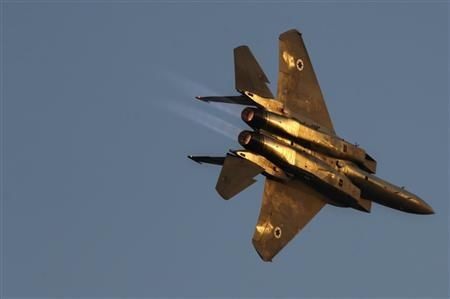Israeli Airstrikes In Syria Show Israel Worries About Hezbollah, Not The Islamic State Group

As the U.S. tries to rally the world around its coalition to fight the Islamic State group in Iraq and Syria, one of its most important allies in the region, Israel, is focused on what it sees as a bigger military threat: Hezbollah, the Shiite militant group operating in Lebanon. The latest strike by the Israeli air force inside Syria, which came Sunday, according to several reports, may have been intended to stop the radical militia from acquiring more weapons that could hit deep inside Israel.
"They have missiles that can strike anywhere in Israel, and they are accurate. The Iron Dome system is not capable of dealing with hundreds of launches a day," Jeff White, defense fellow at the Washington Institute for Near East Policy, said. "Hezbollah has become a basic security threat to Israel."
The Hezbollah threat to Israel has grown exponentially since the 2006 war, White said. Hezbollah is estimated to have 100,000 missiles and rockets now, White said, in comparison with the 10,000 it had in 2006.
Israel launched several airstrikes on an area of Damascus controlled by the government Sunday, and initial reports said the strikes were meant to stop the flow of weapons from Syria’s regime to Hezbollah. The Syrian army said in a statement Sunday that the airplanes hit the Damascus International Airport and another site in the countryside. Syrian activists said on social media that the second target was a smaller airport in the town of Dimas. The U.S. State Department said during a press briefing Monday that it would not confirm reports of the airstrikes.
Despite its proximity to the war raging in Syria between Sunni Islamist militants and the regime, Israel is focusing its efforts on staving off the Shiite alliances in the region.
Nine men living in Golan Heights in northern Israel arrested today by Police after waving Hezbollah flags, situation under investigation.
- Israel News Feed (@IsraelHatzolah) December 8, 2014Israel is less focused now on investing in the fight against the Islamic State group, also known as ISIS, because it "thinks these other groups are more or less nuisances," White said. "They understand the difference between Hezbollah and these other jihadis."
Israel has launched attacks at least four times since 2013. Syrian media reports indicate that at least two targets in Syria were attacked twice within 48 hours in May 2013. Both targets were storage centres for Iranian-made Fateh-110 long-range rockets that were being shipped to Hezbollah in Lebanon.
But even before the civil war began in Syria in 2011, Israel launched airstrikes to destroy the country's weapons. In September 2007, at least four F-16 and four F-15 fighter-bombers conducted a night raid deep inside the country, which destroyed a nuclear facility located near the city of Deir-el-Zour.
Israeli media reported Monday that two senior Hezbollah leaders were killed in the attacks on Sunday. Haaretz said that Al Arabiya News Channel reported that two Hezbollah members were killed in the airstrikes, and one of them was a senior military figure. The Syrian Observatory For Human Rights, a monitoring group in the country, said the second round of airstrikes hit an import-export warehouse filled with weapons for Hezbollah.
"This is nothing new," Alex Vatanka, a fellow at the Middle East Institute, said. "Hezbollah has been a great if not the greatest threat to the Israelis for some time."
Syria did not threaten to retaliate against Israel, but Syria's Foreign Ministry said on Monday it had asked United Nations Secretary-General Ban Ki-Moon and the Security Council to impose sanctions on Israel and described the airstrikes as "a heinous crime against Syria's sovereignty."
© Copyright IBTimes 2024. All rights reserved.





















